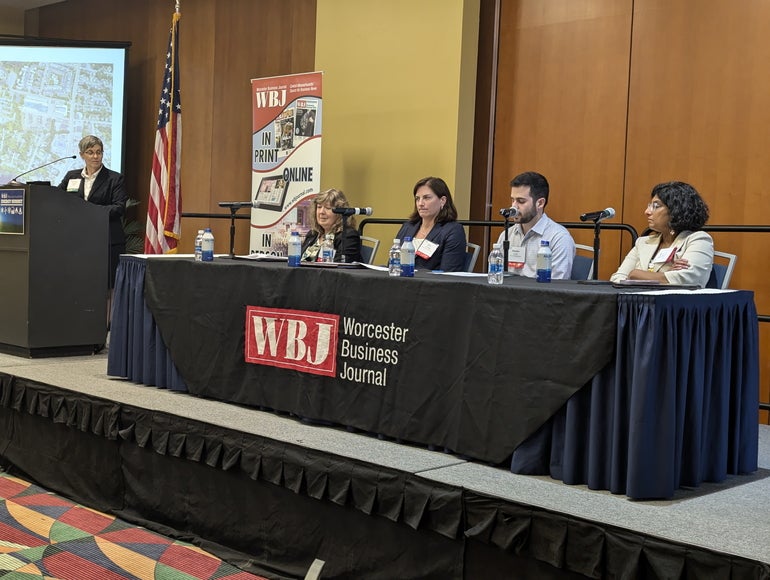Massachusetts is approaching the most challenging period of its decades-long mission to reach net zero emissions by 2050, with decarbonizing the energy sector being a critical part of reaching the state’s next benchmark in 2030, according to Michael Judge, undersecretary of energy at the state’s Executive Office of Energy and Environmental Affairs.
Judge made these statements Tuesday as a keynote speaker of WBJ’s annual Mass Energy Summit, held at the DCU Center in Worcester. At the summit, a number of energy sector experts spoke about how different types of green energy production can contribute to the state’s ambitious decarbonization efforts.
“By 2025, we need to reach a 33% reduction relevant to 1999 levels and by 2030, a 50% reduction. That’s actually the steepest part of the curve between 2025 and 2030,” Judge said, referencing greenhouse gas emission goals set by the state’s Next Generation Roadmap Act, which was signed into law in 2021. “To do this is going to require significant electrification of both the transportation and building sectors, but really the linchpin of all this is the power sector, because if we can’t decarbonize the power sector, then we won’t be able to decarbonize [other] sectors.”
Judge said that reaching the upcoming benchmarks will be an uphill battle and that permitting reform will be key in helping the state reach these goals.
“I’ll be frank, it’s gonna be challenging, if not impossible, to completely reach [those goals],” Judge said. “We feel that we need to deploy this stuff much faster and permit it much faster.”
Saying the current permitting process is not working for communities, developers, or the environment, Judge expressed hope that recent efforts by the Healey Administration to streamline permits involving energy infrastructure will yield dividends.
Municipalities in Massachusetts are finding ways to contribute to decarbonization efforts; the City of Framingham is working with energy supplier Eversource, co-headquartered in Boston and Hartford, Connecticut, to construct a geothermal pilot project in a city neighborhood that contains residential buildings, businesses, and municipal facilities.
The technology uses underground pipes to take advantage of the Earth’s constant temperature, allowing for heat to be extracted from the ground during the winter or discharged into the ground during the summer.
Speaking during a panel discussion, Shawn Luz, sustainability coordinator for capital projects and facilities management for the City of Framingham, said this geothermal system provides unique benefits to businesses and residents.
“The unique part of the geothermal network is that instead of having to deploy each piece of that system at an individual building, this network is using a horizontal piping well that runs across the neighborhood to connect buildings together,” Luz said. “A major aspect of his efficiency is that buildings can share heat between each other. A common example is if you have an ice rink, you don’t want heat there. You’re gonna be trying to pull heat out of that building that can be used by other buildings connected to the network, who can use that heat.”
Speaking as the event’s closing keynote speaker, John Parsons, deputy director for research at the Center for Energy and Environmental Policy Research at the Massachusetts Institute of Technology, said that the often-discussed hydrogen energy capabilities of Quebec offer Massachusetts and other New England states the opportunity to effectively use the Canadian province as a battery, drawing energy from it when needed and sending excess energy back when wind and solar sources are producing energy that outpaces demand.
“What we’re talking about is let’s change how we think of connection, not as a source of import, but as a giant battery,” Parsons said. “We would take power from Quebec when the solar and the wind are not flowing, and when there’s excess solar and wind in New England, we would send the power back up.”
Parsons said such a system would take infrastructure upgrades, but presented the opportunity to have the state’s various different types of clean energy complement each other, rather than be seen as competing against each other.
In addition to discussing the potential positive impact of solar, wind, hydro power, and emerging fusion technology, Parsons discussed the potential impact of nuclear energy, specifically noting recent efforts to create small micro-reactors that could power business campuses, universities, or hospitals.
“We’re exploring this as a possibility,” said Parsons, referencing a micro-nuclear project currently being explored in Nome, Alaska that uses cogeneration to produce electricity and heat simultaneously. “There are a bunch of people who are doing the actual technology development of trying to create these very small scale reactors at the same scale you could use for a hospital or a university that currently has cogeneration on its campus.”

